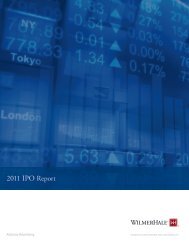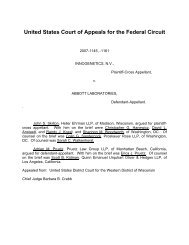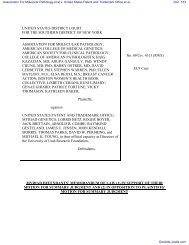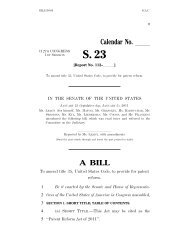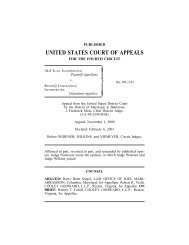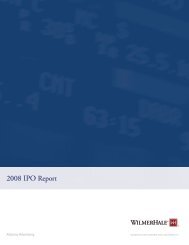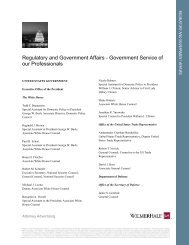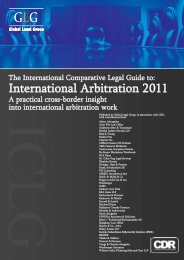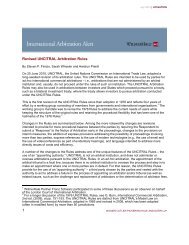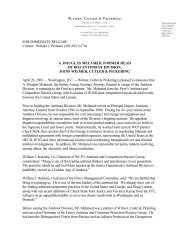2009 IPO Report - WilmerHale
2009 IPO Report - WilmerHale
2009 IPO Report - WilmerHale
- No tags were found...
You also want an ePaper? Increase the reach of your titles
YUMPU automatically turns print PDFs into web optimized ePapers that Google loves.
12Takeover Defenses in <strong>IPO</strong> CompaniesDuring the past several years,either in response to pressure fromstockholders or on their own initiative,the boards of many established publiccompanies have dismantled a numberof the anti-takeover provisions thatpreviously were considered standard.<strong>IPO</strong> companies, however, continueto implement anti-takeoverprovisions despite their decliningpopularity among established publiccompanies, primarily because:■the need for takeover defenses maybe greater given the <strong>IPO</strong> company’sstate of development, growth prospectsand market capitalization;■the existence of strong takeover defenseshas not historically had an adverseeffect on the marketing of <strong>IPO</strong>s; and■unless provisions required to beimplemented in the corporate charterare put in place prior to the <strong>IPO</strong>, itwill be virtually impossible to adoptthem after the company is public.The following is a summary of the mostcommon anti-takeover provisions adoptedby public companies, and some of thequestions to be considered by an <strong>IPO</strong>company’s board in evaluating them:Classified BoardsShould the entire board stand forre-election at each annual meeting,or should directors serve staggered threeyearterms, with only one-third of theboard standing for re-election each year?Opponents of classified boards believethat annual elections increase directoraccountability, which in turn improvesdirector performance, and that classifiedboards entrench directors and fosterinsularity. Supporters, however, believethat classified boards enhance theknowledge, experience and expertiseof boards by helping ensure that, at anygiven time, a majority of the directorswill have experience and familiaritywith the company’s business. Supportersalso believe classified boards promotecontinuity and stability, which in turnallow companies to focus on long-termstrategic planning, ultimately leading to abetter competitive positionand maximizing stockholder value.Limitation of Stockholders’Right to Remove DirectorsShould stockholders be able to removedirectors from office without cause?One consequence of a classified boardin a Delaware corporation, unless thecompany’s corporate charter providesotherwise, is that directors can onlybe removed by the stockholders for cause.When a classified board is eliminated, thedirectors can be removed with or withoutcause. Sometimes, the right to removedirectors is further limited by requiringa supermajority vote. Institutionalinvestors react particularly negativelyto provisions that require a supermajorityvote to remove a director for cause.Limitation of Stockholders’ Right toIncrease Board Size or Fill VacanciesShould stockholders have the right toincrease the size of the board and theright to fill vacancies, or should thoserights be reserved for the board?Activist investors believe that stockholders,as the ultimate owners of the company,should have a relatively unfettered abilityto change the composition of the boardand install directors they believe will bemore responsive to stockholder wishes.Supporters of limitations on these rightsbelieve that long-term value creationrequires stability and continuity in theboard, and that investors are appropriatelyprotected against entrenchment by thedirectors’ state law fiduciary duties,director independence requirements,and the stockholders’ ultimate abilityto elect replacement directors.Supermajority Voting RequirementsWhat stockholder vote should berequired to make changes to governanceprovisions or approve mergers: a simplemajority or a “supermajority”?Opponents of supermajority voterequirements believe that simple-majorityprovisions make the company moreaccountable to stockholders, leadingto better performance. In addition,opponents believe that supermajorityrequirements can be almost impossibleto satisfy because of abstentions andbroker non-votes, thereby frustratingthe will of the stockholders. Opponentsalso view supermajority requirementsas entrenchment provisions used toblock initiatives that are supported byholders of a majority of the company’sstock but opposed by management andthe board. Supporters, however, claimthat supermajority vote provisions helppreserve and maximize the value of thecompany for all stockholders by ensuringthat important protective provisions areeliminated only when it is the clear will ofthe stockholders. When companies havesupermajority provisions, the required votegenerally ranges between 60% and 80%.Prohibition of Stockholders’ Rightto Act by Written ConsentShould stockholders have the rightto act by written consent withoutholding a stockholders’ meeting?Almost all private companies make useof written consents as an efficient wayto obtain required stockholder approvalswithout the need for convening a formalmeeting. In contrast, most publiccompanies do not allow stockholders to actby written consent. They instead requirethat all stockholder action be taken at aduly called stockholders meeting, for whichstockholders have been provided detailedinformation about the matters to be votedon, and at which there is an opportunityto ask questions about proposed business.Limitation of Stockholders’ Rightto Call Special MeetingsShould stockholders have the right tocall special meetings, or should they berequired to wait until the next annualmeeting to present matters for action?Many public companies provide thatonly the board or specified officers ordirectors are authorized to call specialmeetings of stockholders. This couldhave the effect of delaying until the nextannual meeting actions that are favoredby holders of a majority of the company’sstock. Other companies allow stockholdersholding more than a specified threshold



